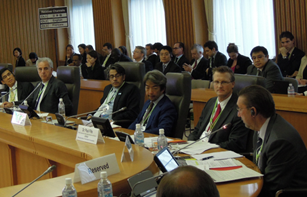
Dr Paul De Lay at the MDGs Follow-up Meeting
Credit: UNAIDS
The Government of Japan, along with the United Nations Development Programme (UNDP), the United Nations Children's Fund (UNICEF), the World Bank and the Japan International Cooperation Agency (JICA), convened a follow-up meeting on 2-3 June 2011 in Tokyo to discuss the outcomes of the UN Millennium Development Goals (MDGs) Summit that took place in September 2010.
With less than five years remaining before 2015, the target year for achieving the MDGs, the meeting brought together high level delegations from more than 100 countries and international organizations, and provided a unique opportunity to exchange knowledge, as well as to discuss more effective measures to strengthen coordination among a broad range of stakeholders.
The meeting was opened by H.E. Prime Minister Kan, who expressed deep appreciation for the solidarity shown by the international community in the wake of the unprecedented earthquakes and tsunami on 11 March 2011. Mr Kan also assured the audience that Japan remains committed to the achievement of MDGs.
Japan remains fully dedicated to carrying out faithfully the international commitments it has expressed in the past to achieving the MDGs
H.E. Mr. Takeaki Matsumoto, Minister of Foreign Affairs of Japan
Mr Takeaki Matsumoto, Japan’s Minister of Foreign Affairs, underlined this commitment saying, “Japan remains fully dedicated to carrying out faithfully the international commitments it has expressed in the past to achieving the MDGs.”
UNAIDS Deputy Executive Director, Programme, Paul De Lay took part in the meeting and also participated in one of the several side events, titled Preparing the health systems for the challenges beyond MDGs.
“UNAIDS has called for taking HIV out of isolation. At the High Level Meeting on AIDS next week, one of the major themes will be “integration”, including exploring synergies between HIV programmes and preventing and caring for non-communicable diseases,” said Dr De Lay.
UNAIDS has called for taking HIV out of isolation. At the High Level Meeting on AIDS next week, one of the major themes will be “integration”, including exploring synergies between HIV programmes and preventing and caring for non-communicable diseases
UNAIDS Deputy Executive Director, Programme, Paul De Lay
The event, moderated by Dr Suwit Wibulpolprasert, Senior Advisor on Disease Control, Ministry of Public Health, Thailand, included presentations from Michel D. Kazatchkine, Executive Director, The Global Fund to Fight AIDS, Tuberculosis and Malaria; Dr Mickey Chopra, Chief, Health Section, Program Division, UNICEF; and Dr Kenji Shibuya, Professor and Chair, Department of Global Health Policy Graduate School of Medicine, The University of Tokyo.
Coming just days before the UN High Level Meeting on AIDS in New York, the meeting enabled participants to exchange their good practices and also learn from others about projects and programmes focused on hard-to-reach regions and groups. Participants also discussed the “way forward” beyond 2015, using lessons learned in the decade under the current MDGs.
During his visit to Japan Dr De Lay also met with Dr Masato Mugitani, Assistant Minister for Global Health, the Ministry of Health, Labour and Welfare and Mr Masaya Fujiwara, Deputy Director-General for Global Issues of the International Cooperation Bureau, the Ministry of Foreign Affairs to discuss Japan’s active participation in the UN High Level Meeting, especially regarding prevention of mother-to-child transmission of HIV. Dr DeLay also met with civil society representatives who will attend the General Assembly event.




